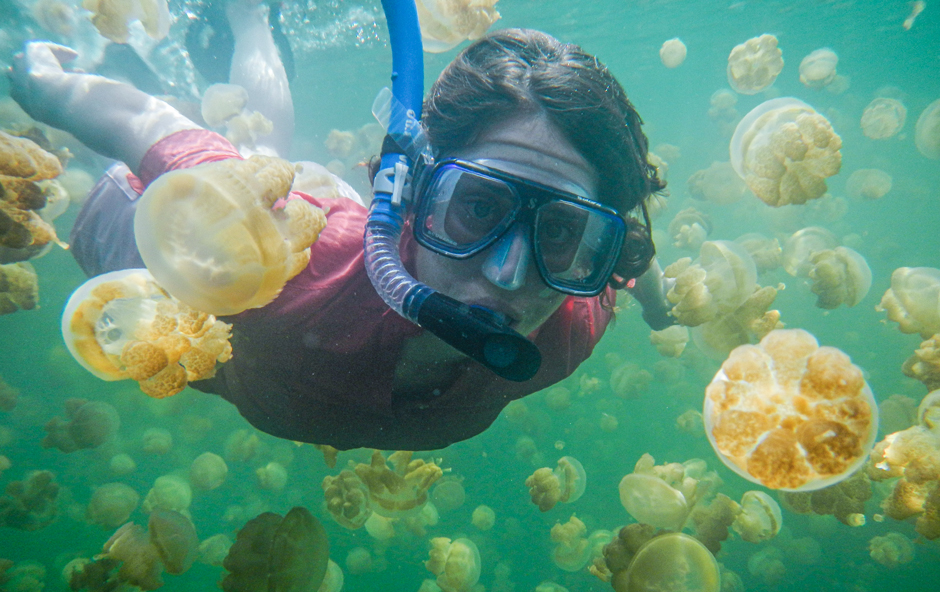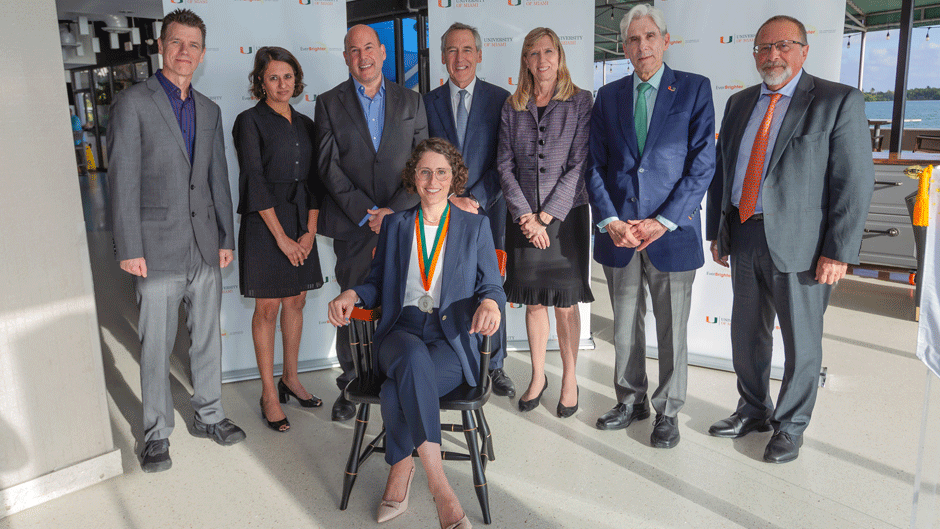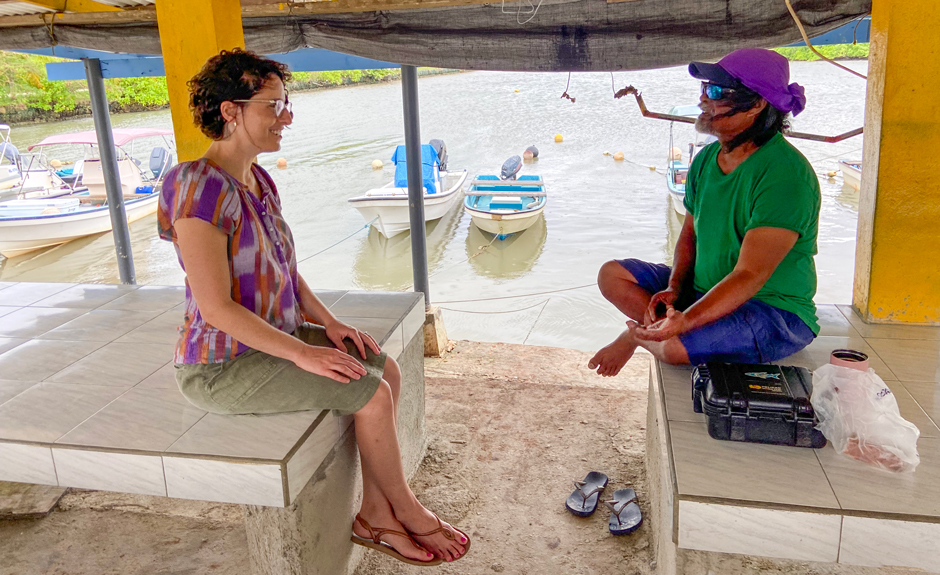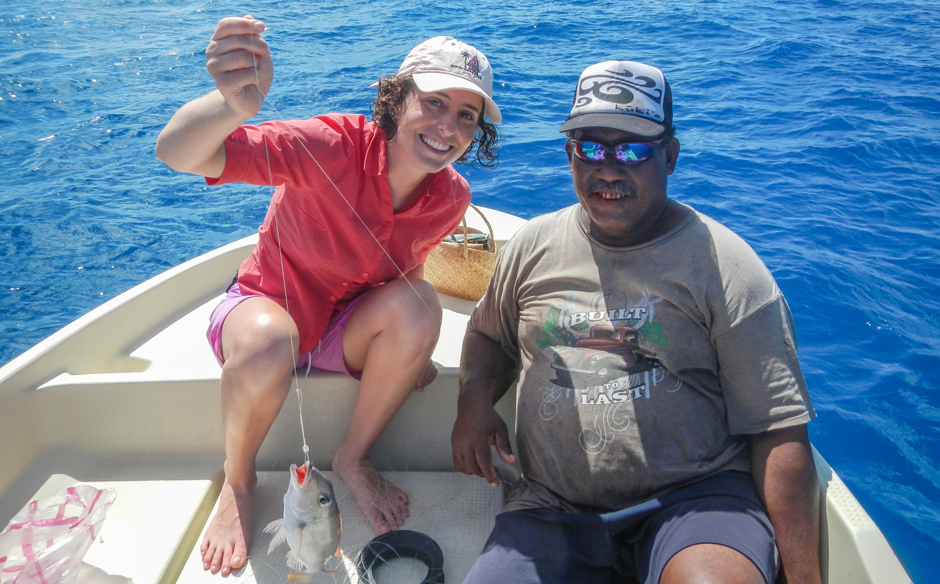While oceans cover more than 70 percent of the Earth, just 8 percent of them are protected by marine sanctuaries.
Seen today as one of the most effective ways to preserve marine life, the strategy of creating marine protected areas, or MPAs, has spread dramatically in the past two decades.
And Rebecca Gruby, a professor of environmental science and policy at the Rosenstiel School of Marine, Atmospheric and Earth Science, has had a front row seat to the evolution of these ocean havens.
For 15 years, Gruby has been studying how MPAs are created, governed, and maintained across the world in places like the Pacific Islands of Palau, Guam, and the Northern Mariana Islands, along with Bermuda and Easter Island, Chile. This includes research on global treaties like the United Nations Convention on Biodiversity, which recently set a goal to have 30 percent of the world’s oceans protected by 2030.

As global conservation targets have increased, so have the size of MPAs. Therefore, in 2014, Gruby and colleagues launched the Human Dimensions of Large Marine Protected Areas project to better understand the social, political, and governance aspects of extremely large—and often remote—MPAs. They are currently leading the first global study to evaluate the management of these massive ocean sanctuaries with Big Ocean, a network of MPA managers.
“In terms of sheer area protected, large-scale MPAs are some of the most important tools of marine conservation globally,” said Gruby, who will share the results of this work at a Sea Secrets lecture in March 2024. “But we don’t know enough about how effectively and equitably they are being implemented, and that’s why this research is so important.”
Gruby’s research group, the Ocean Governance Collaborative, also studies philanthropic foundations that fund ocean conservation to identify and share the most successful strategies for conservation grant-making globally.
What she is learning is helping to educate leaders across the world about the best ways to keep the oceans sustainable, so they maintain biodiversity and benefit people. Her insight also will help guide and inform the Rosenstiel School’s latest endeavor, the Robert K. Johnson Center for Marine Conservation.
“The Rosenstiel School has a long history of groundbreaking work in marine conservation and our goal is to support and build on this work,” Gruby said.
Set to be officially launch this month, the interdisciplinary Center will be focused on elevating the societal impact of marine conservation and policy research across the Rosenstiel School and throughout the University, according to Gruby.
She was honored as the Robert K. Johnson Endowed Professor of Marine Conservation during a ceremony on Friday.

Both the center and the endowed chair were made possible through a gift of more than $8 million to Ever Brighter: The Campaign for Our Next Century from Robert K. Johnson, a generous philanthropist with a passion for the environment and exploring nature. When Johnson passed away in 2020, the foundation he created memorialized his love of the water and marine conservation by creating The Robert K. Johnson Center for Marine Conservation at the University of Miami Rosenstiel School, as well as the endowed chair in marine conservation for the director of the center.
“Under Rebecca’s leadership, the Johnson Center for Marine Conservation will bring together faculty, researchers, and students from across the University of Miami and beyond to address the ever present need to create new knowledge and influence for managing and protecting marine resources,” said Roni Avissar, dean of the Rosenstiel School. “And, thanks to the generosity of the Robert K. Johnson Foundation, we will be able to accelerate these efforts at a critically important time.”
Katharine Mach, professor and chair of the Department of Environmental Science and Policy, agreed.
“Her expertise is at the cutting edge of our oceans’ challenges and is central to prospects for a sustainable, vibrant future,” said Mach. “[Gruby] is already making major contributions toward just, effective environmental governance and marine conservation, as we embark on newly needed directions in our teaching, research, and support of societies, both locally and globally.”
In October, Gruby spent a week in Palau, an archipelago in the western Pacific where she has been conducting research since 2009. She was sharing results from the Ocean Philanthropy Research Initiativeabout the impacts of philanthropic funding for marine conservation, in a place that has received plenty of it, so that nonprofits, governments, and local communities can glean positive results. Gruby spoke with the president of Palau, as well as on its national radio station.
“Palau is a world leader in conservation yet it’s also one of the youngest and smallest countries in the world,” she said. “They play an important role globally because they are so innovative in the policies they are willing to try.”
For instance, when visitors enter the country, customs officials make tourists sign a pledge in their passport to protect the environment and respect the culture while in Palau, she said. Now, Palauan conservationists are crafting a code of conduct for donors based on Gruby and colleagues’ research, which aims to educate funders about responsible grant-making practices.
Global marine conservation organizations also are attuned to Gruby’s work. The David and Lucile Packard Foundation is using her research to inform their global grants.

Yet Gruby was not always certain she wanted to study marine conservation. She grew up in South Florida, spending time at the beach and fishing with her father. But she entered college with plans to become a journalist, because she loved chronicling the stories of others.
One day, on a surfing trip with college friends, Gruby was sitting on her board waiting for the next wave when she realized how to pair her hobby with a career. She would study conservation and try to help craft policy that would protect her “happy place,” which was always the ocean.
The next week, Gruby changed her major to natural resource conservation. She went to work at the Environmental Law Institute in Washington, D.C., and thought she might become a lawyer. She soon realized that she preferred research and eventually earned her doctorate in environmental governance at Duke University. Before joining the Rosenstiel School, Gruby was a faculty member at Colorado State University for nine years.
Throughout her research, Gruby stays true to her interest in understanding people’s stories by conducting her research from a social science approach. This means she engages people with diverse perspectives, such as those in the fishing industry, residents, Indigenous people, government officials, nonprofits, and individual donors.
“The natural sciences have long been prioritized in marine conservation, but recently there has been more recognition that conservation is fundamentally about people and good governance,” she said. “Governments, NGOs, and funding agencies are starting to recognize the importance of social science, as well as local and Indigenous knowledge, in informing marine conservation. And that gives me hope.”
Catherine MacDonald, a research assistant professor who leads the Shark Research and Conservation Program (SRC), is the Johnson Center’s second faculty member. In the coming months, Gruby will bring on board additional faculty and staff members to help broaden the center’s expertise.

Gruby also is teaming up with the Rosenstiel School’s Rescue a Reef citizen science program for a new event and outreach program, “H2O, Hopeful Healthy Oceans,” on Jan. 26 and 27. The event will include a marine-themed art exhibition created by young Miami artists and a panel discussion with leading scientists, artists, and communicators at the Lakeside Village Expo Center on the Coral Gables Campus. She is eager to collaborate with other groups in the future to create initiatives that combine science and art and engage the public in innovative ways.
“I am honored to be the first woman, the first mother, and the first social scientist to hold an endowed chair at the Rosenstiel School,” Gruby said. “I look forward to charting an inclusive path to success for our center that will help protect our oceans for future generations.”
This post was originally published on this site be sure to check out more of their content







